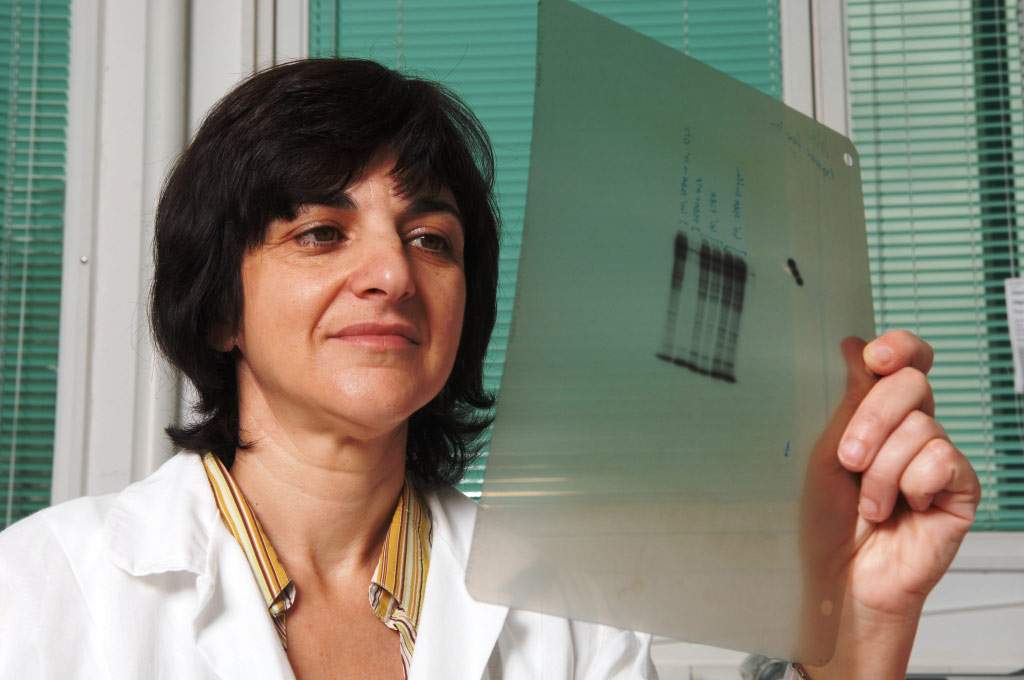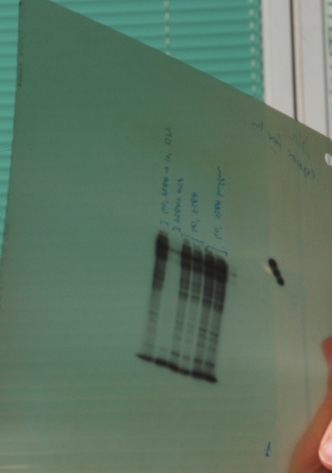At any given moment in the cell, all sorts of genes are being activated and proteins are getting churned out one after the other. One of the big shots directing this activity is the protein NF-kappaB – a sort of production overseer responsible for the activation of many of the genes that are crucial for the cell’s daily operations. In healthy cells, NF-kappaB activity is transient and gives its orders on the basis of need. But in chronic inflammation and certain types of cancer, it keeps on working long after the need has passed. When its activity becomes abnormally constant, it can lead to the spread of the cancer cells that cause malignancy and increase the resistance of these cancer cells to chemotherapy. For this reason, NF-kappaB and the pathways it activates are thought to be attractive targets for cancer treatments.
NF-kappaB activity affects tumors in several ways: It both represses planned cell death (apoptosis) and promotes cellular processes that lead to unregulated growth. Many scientists studying the protein focus on the initial stages of NF-kappaB activation, when it receives an external signal that sends it from the cell’s body into its nucleus. But
Prof. Rivka Dikstein of the Biological Chemistry Department investigates the last step in the protein’s chain of activity: the expression of groups of genes. Around 100 genes are known, at this point, to be activated by NF-kappaB; these hold the instructions for producing, among other things, proteins that play a role in inflammation and cell growth.
Another group of genes activated by NF-kappaB produces a negative feedback mechanism whose function is to bring the protein’s activity to a halt. In earlier research, Dikstein showed how NF-kappaB-regulated genes become activated very rapidly in response to outside signals, especially those that threaten the cell’s survival. She is now investigating how NF-kappaB affects the transcription of the genes it oversees.
Transcription is the first crucial stage of gene expression. It can be broken down into several steps: initiation, elongation (the production of RNA molecules), processing and termination. Dikstein discovered that NF-kappaB is an important regulator of the elongation step. Here, it acts as a sort of foreman, rounding up a “crew” of workers to get the job done. When an entire crew makes a combined effort, the upshot is a significant increase in the number of RNA molecules ready for protein production.
Dikstein and research student Gil Diamant recently uncovered a previously unknown mechanism that suggested to them a possible explanation for the unrelenting NF-kappaB activity in chronic disease and cancer. The mechanism involves one of the elongation work crew, a protein called DSIF. They found that this protein is responsible for the coupling that occurs between the elongation stage and that of RNA processing, which takes place in tandem with elongation. Without this coupling, RNA cannot be processed, and protein production is stalled. Together with NF-kappaB, DSIF promotes the expression of the negative feedback genes that put the brakes on NF-kappaB activity. In cells depleted of DSIF protein, or in which its activity is perturbed, NF-kappaB activity becomes abnormally prolonged and the risk of developing NF-kappaB-associated diseases rises. The
findings of the study recently appeared in
Cell Reports.
The discovery of the DSIF mechanism could be good news in the war against cancer. Because NF-kappaB is entrusted with regulating so many biological processes, any attempt to interfere with it would spell disaster for the expression of many genes and thus cause any number of harmful side effects. DSIF, in contrast, has a much more limited effect on a smaller number of NF-kappaB-regulated genes, so treatments that affect its activities might be more selective, and undesirable side effects minimized.
Prof. Rivka Dikstein's research is supported by the Pearl Welinsky Merlo Foundation Scientific Progress Research Fund; the Yeda-Sela Center for Basic Research; the Wolfson Family Charitable Trust; and the Y. Leon Benoziyo Institute for Molecular Medicine. Prof. Dikstein is the incumbent of the Ruth and Leonard Simon Professorial Chair of Cancer Research.

